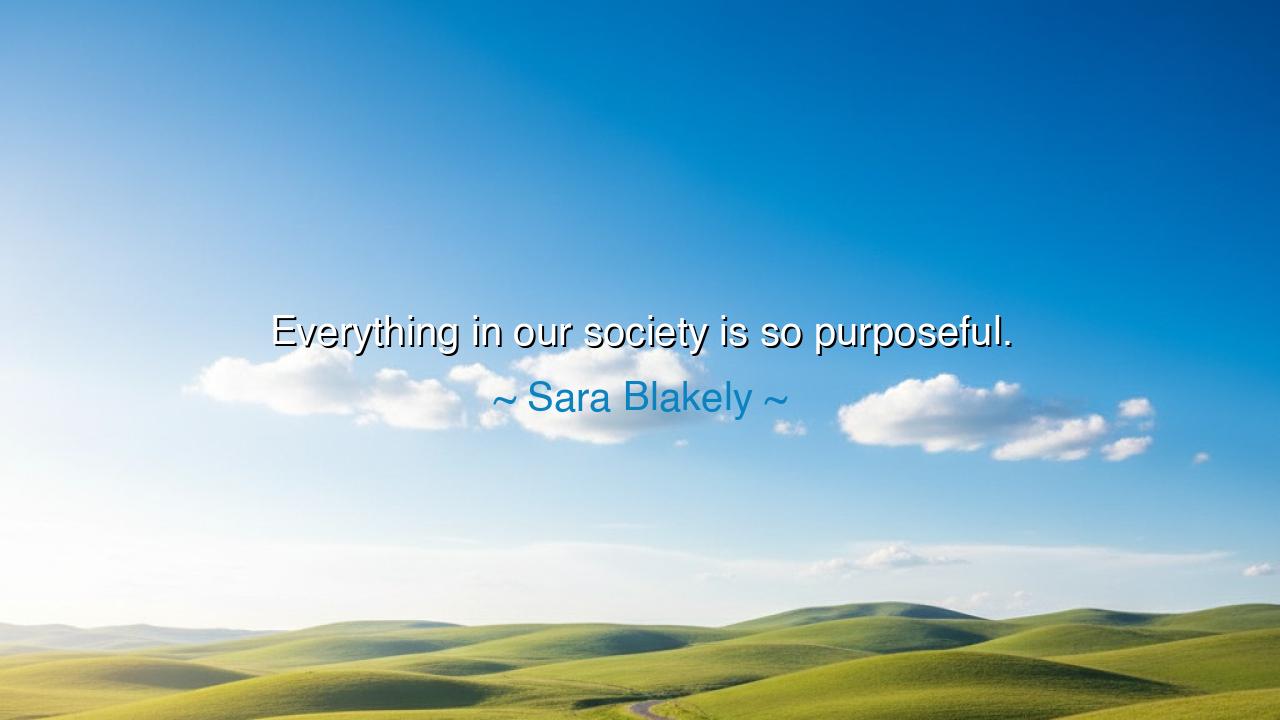
Everything in our society is so purposeful.






Hear the words of Sara Blakely, a woman of vision and enterprise: “Everything in our society is so purposeful.” These words, though simple in sound, are profound in meaning. They speak of the relentless drive of the modern world, where each action, each invention, each moment seems directed toward an end. In this reflection, Blakely unveils the rhythm of our age: a society that rarely drifts aimlessly, but instead constructs systems, tools, and choices with deliberate intent. Purpose is not hidden, but woven into the very fabric of daily life.
The origin of this thought lies in Blakely’s journey as the founder of Spanx, a company born from necessity, shaped by ingenuity, and propelled by determination. She looked at the world around her and saw not accidents, but designs—problems waiting for solutions, challenges waiting for creators. To her, society was a field where every product, every system, every rule had been fashioned to serve some aim. In marveling at this truth, she acknowledged both the power and the weight of a world where purpose governs all.
The ancients, too, pondered such matters. Aristotle spoke of telos, the final cause, the ultimate purpose for which a thing exists. He believed that nothing in nature was without aim: the seed strives to become a tree, the child strives to become an adult, the soul strives for happiness. In echoing this, Blakely reveals that modern society, though clothed in machines and commerce, follows the same eternal law: that all things are shaped by intent, and to live well is to recognize that intent and work with it, not against it.
Consider the story of Thomas Edison, who transformed the world with light. The lamp that banished the night was no accident, but the fruit of thousands of trials, each failure driven by a purpose: to give humanity mastery over darkness. Society itself was altered, commerce and culture reshaped, not by chance but by intent. Here we see the truth of Blakely’s words: what surrounds us is not random, but purposeful, born of vision and labor.
Yet her words also carry a warning. If “everything is purposeful,” then we must ask: whose purpose? For not all aims are noble. Systems may be designed for profit more than for justice, for convenience more than for compassion. A society built upon purpose without conscience may achieve wonders, yet still leave souls empty. Thus, the responsibility falls upon each of us not only to recognize purpose but to discern it, to ensure that what we build serves humanity rather than diminishes it.
The meaning of this quote is therefore double-edged: it is both an invitation to marvel and a call to vigilance. It tells us that we live not in chaos but in a designed world, yet it also reminds us that design must be guided by wisdom. To see purpose in all things is to awaken to the power of intention, but to accept purpose blindly is to risk becoming servants of ends we do not choose.
Therefore, children of the future, engrave this teaching upon your hearts: live purposefully in a purposeful society. Do not wander as if life were random, for all around you are examples of vision made manifest. But do not be passive either—become architects of better purposes. Ask yourself: does what I create serve not only me but others? Does it uplift or exploit? For when each person weds intention with virtue, society’s purpose becomes not merely functional, but noble. And in such a society, greatness is not accidental—it is inevitable.






AAdministratorAdministrator
Welcome, honored guests. Please leave a comment, we will respond soon